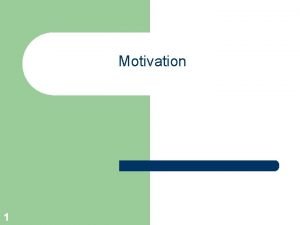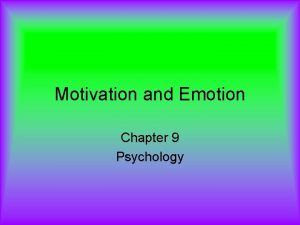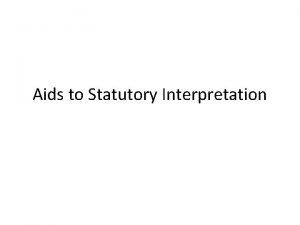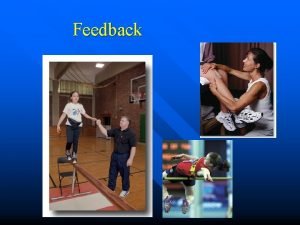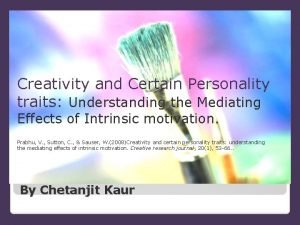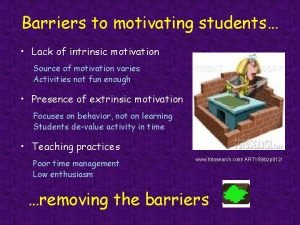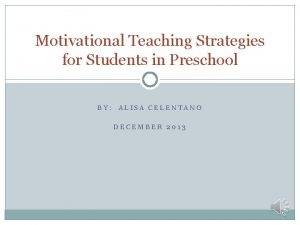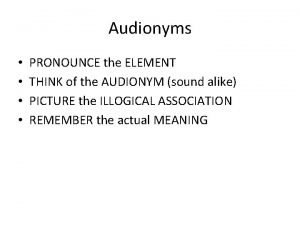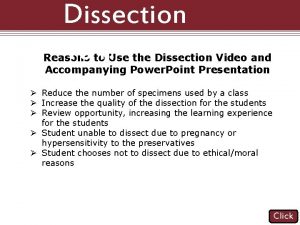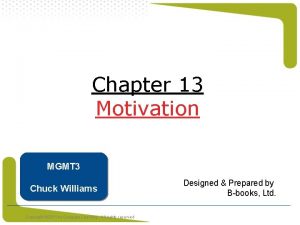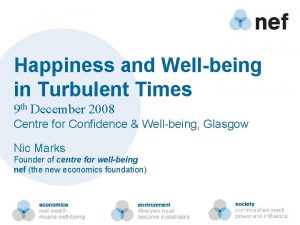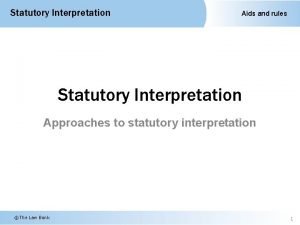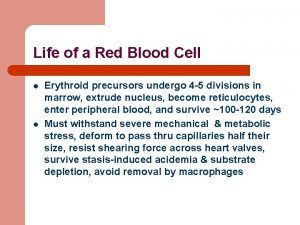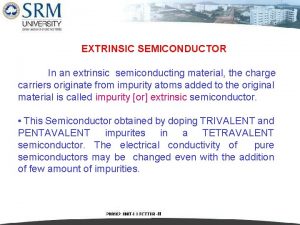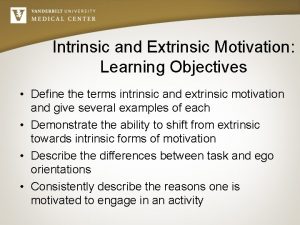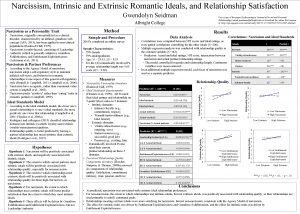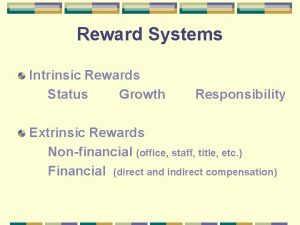Intrinsic Motivation Intrinsic Motivation vs Extrinsic Motivation The













































- Slides: 45

Intrinsic Motivation

Intrinsic Motivation vs Extrinsic Motivation

The Candle Problem • Attach the candle to the wall • Light the candle • No wax can drop on the floor Click to reveal answer

The Candle Problem • Karl Duncker (1945) • Test creative solutions • When tacks were left outside of the box, the solution was easily found.

The Candle Problem • Glucksburg (1962) • First look at motivation • Some subjects were offered NO PRIZE • Some subjects were offered $5. 00 to $10. 00 (depends on how fast they finish) $41. 00 to $166. 00 (2018)

Offering money is an example of _______? Positive Reinforcement Who performed better Money or No Money? No Money

Why did this happen? Overjustification Effect – lowers intrinsic motivation (crowding out) Competition – causes stress Stress – shuts down problem solving (prefrontal cortex)

Overjustification Effect • This process is known as "crowding out" since whatever motivation for the task that previously existed — as estimated by the control condition that was not offered compensation for the task — has been crowded out by motivation merely based on the payment.

Why did this happen? Operant Conditioning says extrinsic rewards should increase motivation

Edward Deci • Multiple puzzles or IQ Test questions • ½ were paid a flat fee • ½ were paid based on performance • After the test, he let them stay in the room SOMA cube • Measured how many continued answering the questions

Who answered additional questions? Flat fee

Lepper et al. found that children who were told that they would receive a reward in exchange for drawing — something they had previously shown to be intrinsically interested in — subsequently became less interested in drawing after the reward was given, compared to those who received a reward unexpectedly or who received no reward at all.

Kruglanski et al. found that if high school students were promised an extrinsic incentive before engaging in a variety of tasks, the students showed less creativity and subsequently reported enjoying the task less compared to those who were not promised payment at the outset.

In a follow-up study that replicated the basic pattern of results from 1971, Deci later found that offering verbal praise as a reward for task completion did not have a similar backfiring effect as offering a monetary reward had.

Crowding out occurs when: • Previously intrinsically motivated • Rewards are known in advance (expected) • Rewards are tangible

ANAGRAMS

CAT ACT

TAR RAT

THERE THREE

TACO COAT

LISTEN SILENT

THE EYES THEY SEE

VIOLET I LOVE IT

EARTH HEART

BINGE BEGIN

REDRUM MURDER


Anagrams • Harter (1978) • Anagram task • Some children were told that it was simply a word game that they might enjoy • Some children were told they would be graded on performance

Results • Performance Test • Avoided challenge (easier anagrams) • Less pleasure (smiling) • Perceived comparable anagrams to be more difficult • Said they preferred easier anagrams to avoid bad grades. • Threat of bad grades made them nervous or anxious

List 1 MUG GUM NIGHT THING VASES SAVES VECTOR COVERT

Feedback: Good for you Good you, you must be smart Good for you, you must have worked really hard.

List 2 (experience failure) MARCHING CHARMING NAMELESS SALESMAN LICENSED SILENCED TEACHING CHEATING THICKENS KITCHENS

List 3 (after experiencing failure) HOST SHOT INCH CHIN FIBER BRIEF GLARE LARGE SISTERS RESISTS

Problems solved Results: List #1 List #2 Good you, Goodfor you, you must Good for you must be have worked smart really hard.

Anagrams • Todd Zakrajsek • 32: 47 • https: //www. youtube. com/watch? v=j. X 9 xtti. Uc. MQ

Motivation Controlled vs Autonomous

Motivation • Historical view – only amount of motivation matters • A bigger carrot or stick • Quality of behavior NOT Quantity of behavior • Memorization vs Understanding (concepts)

Controlled Motivation • Seduced • Coerced • Pressured • Take short cuts

Autonomous Motivation • Volition and choice • Endorsement • Interesting / enjoyably • Deeply Valued

Autonomous Motivation • Creativity • Problem Solving • Performance • Positive Emotions • Psychological & Physical Wellness

Autonomy Supportive Environment

Autonomy Support • Their perspective • Choice • Explore • Self initiation • Rationale

Results in • Happier • Deeper / conceptual learning • Confident and competent

Deci’s Conclusion: • Don’t ask how you can motivate others! • Ask how you can create the conditions within which others will motivate themselves

Feeling empowered 1. Can you do it? (self-efficacy) 2. Will it work? (response-efficacy) 3. Is it worth it? (motivation – consequence)
 Behaviorally anchored rating scale
Behaviorally anchored rating scale Example of motivation
Example of motivation Intrinsic aids
Intrinsic aids Explain intrinsic and extrinsic approaches to criticism
Explain intrinsic and extrinsic approaches to criticism Intrinsic property
Intrinsic property Task intrinsic feedback
Task intrinsic feedback Elements in literature
Elements in literature Extrinsic elements examples
Extrinsic elements examples Semiconductor conductivity vs temperature
Semiconductor conductivity vs temperature Intrinsic and extrinsic character traits
Intrinsic and extrinsic character traits Intrinsic parameters of food
Intrinsic parameters of food The term extrinsic motivation refers to reasons to act that
The term extrinsic motivation refers to reasons to act that Intrinsic motivation examples
Intrinsic motivation examples Intrinsic motivation examples
Intrinsic motivation examples Lack of intrinsic motivation
Lack of intrinsic motivation Teacher feedback for students examples
Teacher feedback for students examples Intrinsic motivation
Intrinsic motivation Motivation and its types
Motivation and its types Extrinsic muscles of eye
Extrinsic muscles of eye Anatomy of floor of mouth
Anatomy of floor of mouth Algia audionym
Algia audionym Cow eye
Cow eye Histology of tongue ppt
Histology of tongue ppt Extrinsic rewards
Extrinsic rewards Kairos persuasion
Kairos persuasion Palatoglossus
Palatoglossus Dynamic model of wellbeing
Dynamic model of wellbeing Extrinsic hemolytic anemia
Extrinsic hemolytic anemia Muir v keay
Muir v keay Extrinsic camera calibration
Extrinsic camera calibration Extrinsic rewards
Extrinsic rewards Causes of hemolysis
Causes of hemolysis Intercostal artery
Intercostal artery Sensory supply to the soft palate
Sensory supply to the soft palate Psychology in action huffman
Psychology in action huffman Extrinsic camera calibration
Extrinsic camera calibration Factors affecting bacteria growth
Factors affecting bacteria growth Cong thức tính động năng
Cong thức tính động năng Môn thể thao bắt đầu bằng từ đua
Môn thể thao bắt đầu bằng từ đua Thế nào là mạng điện lắp đặt kiểu nổi
Thế nào là mạng điện lắp đặt kiểu nổi Hình ảnh bộ gõ cơ thể búng tay
Hình ảnh bộ gõ cơ thể búng tay Dạng đột biến một nhiễm là
Dạng đột biến một nhiễm là Vẽ hình chiếu đứng bằng cạnh của vật thể
Vẽ hình chiếu đứng bằng cạnh của vật thể Biện pháp chống mỏi cơ
Biện pháp chống mỏi cơ độ dài liên kết
độ dài liên kết Voi kéo gỗ như thế nào
Voi kéo gỗ như thế nào
